On the high seas of west Africa’s Gulf of Guinea, the rear deck of the US warship Dallas is a nest of smokers and fishermen. The crew members are kicking back on this sunlit Sunday morning, enjoying a rare spot of ‘holiday routine’ during a gruelling tour of duty in the region. One of the anglers, Ansel Jones, an engaging petty officer from Mississippi, is telling me about life at sea and the rococo port calls he and his shipmates have enjoyed. ‘We are sailors,’ says Jones, with a southerner’s twinkle, ‘we fit the stereotype’.
As we talk, the rod that Jones has rigged off the stern suddenly clatters into life, dancing staccato on the deck. He dives over to grab it and starts trying to reel his catch in. A crowd gathers, already sensing the possibility of an epic fight. Someone hands Jones a special fisherman’s girdle, into which he snaps the rod for greater purchase and stability. ‘I have been waiting for you for two months’ now,’ he calls out in the direction of his quarry. ‘Come on, you son of a bitch.’
After dragging on a cigarette and gulping down some iced water, Jones settles himself for a long contest. He reels in periodically, trying not to give too much back when the fish resists. Then we see bubbles, followed shortly afterwards by an iridescent flash of silver. Jones manoeuvres his tiring target to the starboard rail, away from the propellers. Suddenly, it appears fully at the surface, prompting a gasp of admiration. It’s a handsome yellowfin tuna, surely between three and four feet long.
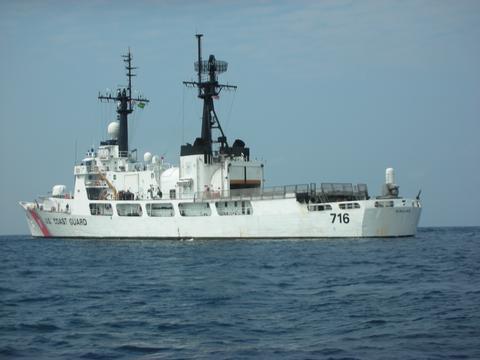
Jones, on the verge of victory, begins a final effort to draw the fish in. It is at the surface almost constantly now, making brief, abortive darts back below. Jones bends his back once more, starting to rip the tuna from the surface of water and towards the deck above. Another crew member is dangling a grappling hook over the side, ready to pull the catch in.
Then, calamitously – at the very moment of success – the line snaps. The crowd groans. The tuna, reprieved at the last, jerks away into the depths. A half-hour struggle has ended in defeat. This big, beautiful, succulent fruit of the Gulf of Guinea that looked ready to be plucked by the sailors is instead gone for good.
Jones takes the frustration well, grimacing as he receives consolatory pats on the back. The problem, he says, is that the ship is too large and cumbersome to land the catch. He needed to be in a smaller boat, where he wouldn’t have needed to haul such a great weight over the high sides. Flawed logistics and execution meant this succulent west African prize got away from the US military. ‘That was a big yellowfin tuna,’ he says. ‘That would have fed all of us.’
Jones’ Gulf of Guinea battle is part of a much bigger struggle involving the US at one of the world’s greatest and most coveted new oil frontiers. The Dallas – a US Coastguard ship whose more natural milieu is Caribbean drugs busts – is patrolling far from its South Carolina home as part of a year-old American-led initiative called the Africa Partnership Station. Under this, US vessels are maintaining a ‘persistent presence’ in the seas around the domino run of countries that curve from Senegal on the western edge of the Gulf of Guinea to Angola in the south. US officials say their programme is not just about the oil, although there’s too much of it at stake here for them to deny it’s an important factor.
In an era during which – until recently – oil prices seemed to soar almost daily to historic highs, it pays to stake your claim in the world’s coming crude-rich Gulf. All around west Africa are taking place the contests that will help define the future of big oil and the world it drives. The region – seen as a possible partial insurance against turmoil in the Middle East – is at the heart of the geopolitical battle between the west and other growing powers, principally China. It makes for a vibrant industry, but also one whose legitimacy and ability to operate are threatened by armed militancy, community protests, corruption and oil smuggling. The blend of volatile domestic politics and geostrategic oil interests is at best opaque and at worst thoroughly corrosive of all involved.
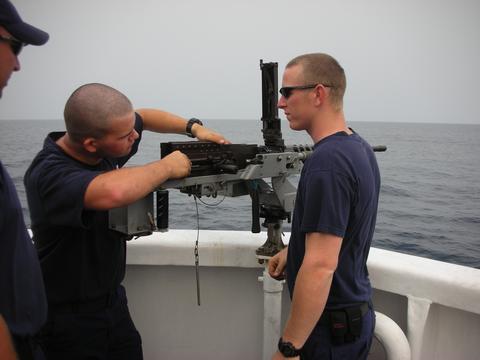
The story of west African oil has fascinated and disturbed me during the almost eight years I’ve known it. Three years spent as the Financial Times correspondent in Nigeria came particularly to inform the way I saw the energy industry and its role in the wider world. I find it hard now to look at anything connected with crude – whether the rawness of a Niger Delta slick, or the neatness of a Royal Dutch Shell filling station forecourt – without thinking of how it has moulded Africa’s Leviathan and some of its neighbours. For me, the logos of Shell, Chevron and ExxonMobil evoke images of the great pluming orange gas flares that cast a sickly nocturnal glow over run-down villages, where people drink from stagnant pools. The barrels of oil whose price underpins City economic forecasts are what armed young Delta militants – determined, deluded or drunk, or all three at once – siphon from pipelines to fund a black market stretching across continents. Even in an age of often unrestrained realpolitik, it is hard to imagine a dirtier business in which so many of us in the rich world are so intimately and knowingly complicit.
During my time living in Nigeria and visiting it afterwards, I’ve seen how the country – one of the world’s ten most populous – has become a little laboratory for the arrogance of a fossil-fuel-obsessed world. During its reign as Africa’s largest crude producer, it has metamorphosed from pillar of unprecedented Western industrial prosperity to ominous parable for a rapacious age. Even as the oil industry there generates extraordinary riches, it seems to be slowly destroying itself through its own hand and its own hubris.
Nigeria’s tale teaches us that the unfettered global cult of crude hurts not just the countries that produce it but – as slowly and relentlessly as in any Greek tragedy – the nations that consume it, too. That vulnerability is clear in the frequent world oil market spikes caused in part by production disruptions in the Delta. It also looms spectrally over both the Dallas mission and the oil states old and new that the ship is visiting, from Ghana down the west coast to the tiny island nation of São Tomé and Principe in the east.
My rendezvous point with the Dallas is in São Tomé, a picturesque archipelago of less than a quarter of a million people. I’d last visited the country – so small that its initials are jokingly said to stand for somos todos primos (‘we are all cousins’) – in Portuguese, the official language – almost four years previously. I’d come away with a sense that its quotidian torpor was both beguiling and unlikely to last. Already, I could see the money and ambition that the smell of new oil attracts. I’d flown in with the then Nigerian ambassador and seen crates of champagne being unloaded on the runway in São Tomé; travelling back, I hitched a lift from a group of oilmen for whom a red carpet was rolled out at the airport at Lagos.
The task for São Tomé and other aspiring new kids on the oil block is to avoid becoming the latest victims of the so-called paradox of plenty, a phenomenon so common it has become a development cliché. The soundbite refers to tendency of many crude-producing states to be gripped by a malaise of graft and conflict. The reasons are myriad and well-rehearsed, ranging from the temptation that oil wealth offers to rebels and coup-plotters, to the caustic psychological impact of profiting from an commodity that requires little productive effort other than to hire helping hands from overseas to suck it out of the ground. Crude not only fails to bring the riches it should, but in many cases seems to propel nations backwards into tyranny and worsening poverty. When I arrived in Nigeria in 2002, I was shocked – if not surprised – to read a United Nations Development Programme report that said average incomes in the country had declined by an average of 1.5 per cent a year over the last quarter of the twentieth century.
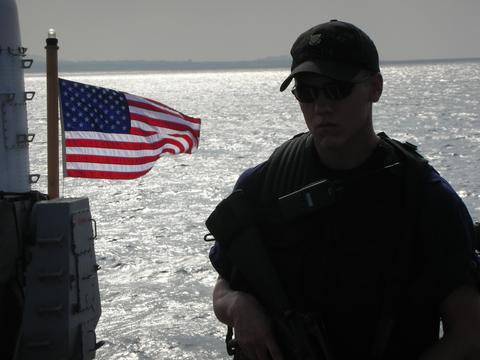
My latest journey into west African oil starts at São Tomé’s main dock, where US officials are preparing for the Dallas visit. The first job is to receive a small boat from the ship loaded with drinks for a reception being hosted by the US that night. Once it arrives – and the crates of wine and Bud Light beer are brought ashore – there’s a small technical hitch, after one of the military officers accidentally drops the keys to one of the cars into the water. The mighty American forces are saved by a São Tomé officer, who strips off, dons flippers and snorkel and retrieves the key from the dark waters.
At the reception, which takes place in the open-air courtyard of the unadorned national parliament building, the islands’ notable citizens are served drinks with napkins depicting the US flag. Across the bay, the red lights of the giant Voice of America radio transmission station blink in and out of sight like a nocturnal predator’s eyes. Officials at the event hand out sweets and neatly-tied copies of the US Declaration of Independence from wicker baskets bought that day from a local trader (at least one item was locally sourced, an official jokes to me). A brass band plays the Star-Spangled Banner on aging instruments, before the cutting of a cake, the icing of which wishes the US a ‘happy 232nd anniversary.’
One of the US officers visiting São Tomé for the occasion is Lt-Col Rene Dechaine, a defence attaché based in neighbouring Gabon. DeChaine, an old hand who has spent time in Korea, Brazil and the UK, argues to me that the US attention to the Gulf of Guinea can do good. He rebuts my suggestion that the Washington’s African adventure could be helping reinforce autocratic governments in a notoriously repressive region. There may be a tension in deciding who to do business with – ‘there always is’ – but the US programme is about helping make local militaries better servants of democracy, rather than sharper instruments of oppression. Besides, he argues, the appetite of countries for US help is growing. ‘Africa is changing,’ he says, in a curious echo of the arguments used by supporters of Chinese expansion on the continent. ‘They are not looking to the former European masters any more.’
The next day, I return to the quayside to meet a small boat dispatched from the Dallas from its anchor spot offshore. The ship is about 378 feet long, about two-thirds the size of a modern destroyer. Its description as a ‘Coast Guard Cutter’ may sound innocuous, but this is a US warship with a 76mm main gun battery and other tarpaulin-covered weapons scattered around the deck. It is, as Bo’sun Jay Bealer puts it to me later, a ship that ‘could probably take on most navies in small countries in the world’.
On board, Bob Hendrickson, the second-in-command, tells me I’m allowed to move freely and talk to whoever I want. If I stumble into any secret areas, he adds dryly, ‘we will just shoot you’. He’s as good as his word about the access, although I never get to test the consequences of a mis-step. Members of the crew have been briefed on what they should and shouldn’t be talking about to me. Details of the mission, politics and personal opinions are all supposed to be off limits, one tells me. ‘We are here to help people,’ she says, adding apologetically: ‘That’s all we are allowed to say.’
The Africa Partnership Station is overseen by the US navy’s sixth fleet from its base in Naples, Italy. The navy says the initiative is a wide-ranging security effort, aimed at curbing illegal fishing, people trafficking and drug smuggling and many other crimes. The programme’s ships have already taken on board scores of local military officers for training and have conducted joint patrols with coastguards from countries they have visited. In separate telephone interviews before I arrived in São Tomé , the navy’s Rear Admiral Anthony Kurta and Commodore John Nowell insisted the initiative was neither solely a US project nor ‘all about the oil’. While it’s true officers from other countries – including Britain – have been involved, there’s no doubt that this is another international coalition dominated by the US.
My fellow guests on the ship are a couple of members of the São Tomé military and two lieutenants from the Equatorial Guinea navy. The Equatoguineans – Placido Nzang and Pablo Esono – are an interesting choice, given the country’s dismal human rights record. President Obiang Nguema Mbasago and his clan have ruled since 1979, amid heavy criticism over election-rigging, corruption and human rights abuses.
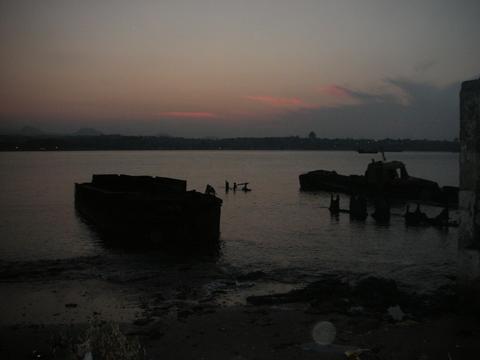
I’d first visited the country for the 2002 presidential elections, at which Mr Obiang was re-elected with 97.1 per cent of the vote. I returned a couple of years later for the trial of some of the alleged mercenaries accused of trying to stage a coup, a hearing that Amnesty International condemned over allegations of torture and many other serious failings. During my visit to the Dallas, Simon Mann, the former SAS officer accused of masterminding the coup, was jailed for 34 years, in another trial rendered almost meaningless by the system under which it took place.
For the next two days, the Dallas patrols in the triangle of ocean between Nigeria, Equatorial Guinea and São Tomé. These are among the most hazardous seas in the world, according to the International Maritime Bureau, which ranked Nigeria as second only to Somalia in terms of acts of piracy during the first three quarters of 2008. The biggest business is the theft of oil, particularly from Nigeria. It’s estimated that many hundreds of millions – or even billions – of dollars of oil have been taken over the past eight years from the creeks of the Niger Delta, loaded into tankers off the Nigerian coast and taken to refineries in the region and beyond for onward distribution in the black market. The trade funds armed militants in the Niger Delta, who are increasingly taking oil workers hostage and attacking installations.
Oil theft is one of the problems the US Africa Partnership Station mission explicitly says it is trying to tackle. Washington’s call to action has been echoed by Nigeria’s President Umaru Yar’Adua, who has compared the trade to the so-called conflict diamond dealings that have fuelled brutal wars in countries such as Sierra Leone. He found a sympathetic ear in British prime minister Gordon Brown, who offered in July 2008 to provide military assistance to help stop the illicit trade. That dismayed British army chiefs as well as human rights campaigners in the Delta, who thought Brown’s remarks ignored the Nigerian government’s deep complicity in the illegal activities there.
The nexus between African piracy, lawless states and oil was highlighted spectacularly in November 2008, when a gang operating off the coast of Somalia seized the Saudi Arabian tanker Sirius Star.
The ship was laden with 2m barrels, about equivalent to Nigeria’s daily production. The hijack soon attracted a swarm of private security experts, many of whom had first hand experience of west Africa’s distinct but parallel problems of criminal gangs operating without interference by local officials. As one kidnap and ransom specialist puts it, in a remark that might apply equally to Somalia or Nigeria: ‘The authorities know who these guys are. They know them right down to the individuals.’ (The Sirius Star was released in January.)
Just before I’d arrived in São Tomé, Nigerian militants had provided their own reminder of the kind of conflicts in which the Dallas and other visiting US ships might become involved. The militants had targeted Shell’s massive Bonga oilfield seventy-five miles out to sea, cutting national production by ten per cent. The attack – the first ever launched offshore – sent a tremor of fear through a region in which much of the oil is sunk deep under the ocean. After I leave, the Dallas will carry out an exercise simulating the defence of an Equatorial Guinea offshore oil platform operated by Marathon, the US multinational.
I ask Capt Wagner what he feels he has the authority to do if he comes across a kidnapping or attack on an oil installation. Lawyers say a complex blend of international agreements and domestic rules governing piracy is causing disagreements about when and how other ships can intervene. Some countries feel that they do not have the power to allow their ships to intervene under the twenty-six-year-old UN Convention on the Law of the Sea, the framework for international maritime rules. The convention authorises ‘repression of piracy’, but only on the high seas rather than in national territorial waters. It also threatens states with financial penalties if they seize ships ‘without adequate grounds’.
Capt Wagner acknowledges his powers are limited while operating in the Gulf of Guinea, although he says he thinks he would be able to respond to an incident of piracy. I ask him whether a Nigerian militant style assault on an oil platform would qualify as such and justify intervention. He replies carefully that he ‘would have to ask the lawyers the definition’. After a moment’s further thought, he says: ‘If someone was in that position, there would be more of a basis for action than for inaction.’
‘If something happens,’ he adds, ‘we are the only US warship in this part of the world.’
Early on my second day on the Dallas, I receive a call on the public address system to go to the bridge immediately. When I arrive, the room is humming as I’ve not seen it before. Capt Wagner is plotting a course to intercept a Japanese vessel that is looming rapidly from the grey morning sky to port. It is the first catch of the day of the mission’s Gulf of Guinea trawl.
A few moments later, Jay Hollister, chief warrant officer, bursts through the door at the back of the bridge and strides over to the radio. Hollister has been summoned to talk to the other vessel, the Kaichi Maru. He is married to a Japanese woman and speaks the language a bit, although he is far from fluent. He starts a halting interrogation, asking in Japanese whether anyone on board speaks English. ‘Japanese only,’ comes the somewhat paradoxical reply, in English. ‘I’m sorry.’
Hollister presses on in Japanese and reports back to his shipmates that the Kaichi Maru claims to be a trawler, operating under licence from São Tomé. In that case, retorts Captain Wagner, ‘ask him where he has set his fishing gear’. Hollister, still a little shy, says he’s going to have trouble asking the question. ‘I don’t know how to say fishing as an adverb,’ he explains. ‘I know how to say fish – but not fishing.’
After a little improvisation – ‘can you say to him, ‘where are your nets?’, suggests one fellow officer – the point is put across successfully. The radio operator on the Kaichi Maru – seemingly unfazed by the US warship bearing down on him – explains calmly that the crew are not working because they have already filled the hold. He offers to send the Dallas a copy of the vessel’s fishing licence, but Captain Wagner tells him not to bother. He waves away Hollister’s apologies for his shaky linguistic skills. ‘You did more than I did,’ he says, with a laugh.
‘So,’ the captain continues, turning to address the whole bridge. ‘Let’s go find something else.’
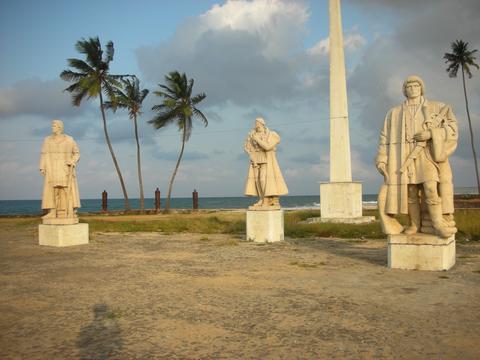
The region that the Dallas is patrolling is a key theatre in the quest to satisfy growing world demand for crude. The US Energy Information Administration has forecast world oil consumption will rise thirty-seven per cent between 2006 and 2030, although that estimate was made before the financial crisis and the consequent sharp fall in prices. The administration forecasts west African production will climb seventy-two per cent over the same period, more than double the rate of expansion of Middle Eastern output. New Gulf of Guinea production – whether in established countries such as Nigeria or virgin nations such as São Tomé – is essential to achieving those growth rates.
The global rush to develop new west African energy projects and expand old ones has brought with it fears of a unregulated free for all in an industry already dogged by examples of proved and suspected corruption. The most high-profile case of the past few years has been the US investigation into whether an international construction consortium, including an ex-Halliburton subsidiary, agreed to pay \$170m of bribes to win billions of dollars of work on Nigeria’s giant Bonny Island gas liquefaction plant. In September 2008, Jack Stanley, a former top executive at the consortium, admitted overseeing an eight-year bribery scheme involving tens of millions of dollars and officials at the highest levels of three successive Nigerian administrations, including the internationally-acclaimed civilian government of President Olusegun Obasanjo. The gas plant’s private sector multinational owners – Shell, Total and Eni – have taken no action against the consortium over the allegations, instead giving it extra work.
Other US probes have identified wrongdoing by big oil industry names such as Baker Hughes, Vetco Grey and Willbros. Few people expect these companies to be the last thus embarrassed. It all brings to mind the comment a journalist colleague of mine made to me after discovering that one of the collapsed US energy company’s Enron’s many alleged misdeeds was to fake a sale of power plants mounted on barges off Nigeria’s coast. Enron and Nigeria, he noted, seemed two particularly well-matched business partners.
Few people think the arrival of the world’s new economic powers in the Gulf of Guinea will help improve behaviour. Instead, anti-corruption campaigners talk gloomily of their fears of a ‘race to the bottom’, as the western multinationals and their new challengers compete ever more aggressively for business. When Nigeria auctioned off 25 exploration blocs in 2006 – many to companies from Asian countries keen to expand their energy resources – the Financial Times reported widespread allegations of ‘political favouritism and back-room dealing’. In December 2008, Transparency International, the anti-corruption group, said companies from China, India, Russia, Mexico, Brazil were perceived as the worst offenders among leading economies in terms of paying bribes to win business.
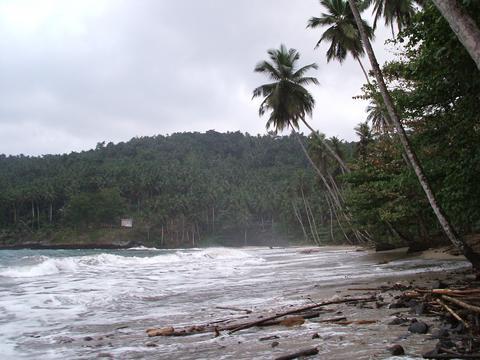
The Dallas’ next stop is Port-Gentil, oil capital of Gabon, to take on supplies and host a lunch with senior naval officers there. Gabon is another oil-rich Gulf of Guinea state not noted for cleaving too closely to the democratic ideals of the US founding fathers. Now that Fidel Castro has stood down, Gabon’s President Omar Bongo is the world’s longest-ruling executive leader. He’s held power since 1967 and has overseen a state in which corruption has flourished and the now-declining oil reserves have been squandered with little to show in terms of long-term infrastructural development. The president has prospered for many years due to his close relations with France, the former colonial power, and the oil company Elf, a number of whose senior executives were jailed in 2003 for their involvement in Gabon-related corruption. The Guardian newspaper has described the case as ‘probably the biggest political and corporate sleaze scandal to hit a western democracy since the Second World War’. When I told one of the Dallas’ officers about Mr Bongo’s history and longevity, I received a nonplussed response: ‘Do they like him there?’
As we pull out of Port-Gentil, trying to avoid the logs from a local sawmill that at times float perilously close, I chat to Lt Frank Montalvo, the ship’s third-in-command. We’re leaning on the rail on the deck to the port side of the bridge, in front of a gyrocompass and a padded white chair specially reserved for the captain. Montalvo, a chunkily-built Texan often seen working out on the Dallas’ rowing machine, has a thoughtful take on life with the military at sea. He’s particularly interested in the sensibility of the younger Americans in the crew, and how they have little awareness of conflict beyond Iraq or – at most – the first Gulf War.
I tell Montalvo that this trip has also made me think about the history of conflict. I say I see parallels between the chaos of the Gulf of Guinea’s oil-producing states and the perfect storm of wildness and corruption that Daniel Yergin’s classic 1990 book The Prize: The Epic Quest for Oil, Money, and Power describes as characterizing the birth of the US crude industry in the 19th century. Montalvo agrees that people tend to forget these things, looking instead at Africa’s leading oil producers as sui generis and saying ‘I can’t believe this is going on’. He says: ‘Well, you know, humanity has a way of repeating certain patterns.’’
Montalvo says he’s seen a headline in a newspaper back home that claims Africom – the US’ African military command established in 2007 – is about oil. Of course that’s a part of it, he admits: the US needs crude, which has ‘a way of maintaining stability in the greater planet’. But this is a mission where ‘corporate interests and human interests have a lot more in common than people give them credit for’, he insists. The initiative has ‘tensions’ – Lt-Col Dechaine’s word again – in areas such as deciding whether it’s right or not to work with certain countries, but the US is determined to be neither censorious nor patronizing. ‘It’s very important for us to keep in mind that we have had these problems too,’ Montalvo says, as Port-Gentil and its huge oil refinery slip behind us. ‘We shouldn’t be taking a high and mighty tone, saying: ‘OK, here you go, let’s explain it to you, let’s write it down in crayons.’’
On my last night aboard the Dallas, Captain Wagner invites me to dinner at his table. Over shrimp gumbo, eaten under the watchful eye of a portrait of Alexander Dallas, the 19th century US Treasury secretary for whom the ship is named, the captain talks about how the US navy is trying to ‘create stability in a region before there are problems’. If it can persuade people to work together over ‘small things’ such as fishing and human trafficking, he says, maybe it can get them to ‘work together on other things to prevent larger escalating conflict’. ‘It’s one of those things where you may not see the thing tomorrow,’ he says. ‘But I think you will see the return a couple of years down the road.’
The captain wants to know more about my experiences in Nigeria and particularly my encounters with militants in the Niger Delta. I say that his ship could have an interesting time scouring the Nigerian coast, where the vessels that distribute stolen oil around the world are said to gather. The captain seems taken by the idea and a little regretful that – along with Angola – Nigeria is an important country the mission hasn’t been able to visit this time. He could conduct a pretty good survey of the coastline in a couple of days, he says. That would be fascinating, I tell him: the question is whether the corrupt domestic and expatriate interests that have fed so richly off the smuggling for so long would ever let him do it.
The captain is upbeat about the Dallas’ west Africa trip, even though he acknowledges the São Tomé visit was a ‘major disappointment’ because of technical problems and the difficulties arranging meetings there. These US African missions are, he says, a way of ‘mending fences’ and creating opportunities for further joint activities. The US is not ending wars – or, he might have added, starting them – but it is helping build important relationships for the future. He tells me about his uncle, who was on board the USS Missouri, the battleship on which Japan surrendered in 1945. ‘That closed one chapter in history and opened another,’ he says. ‘This is kind of the same thing.’
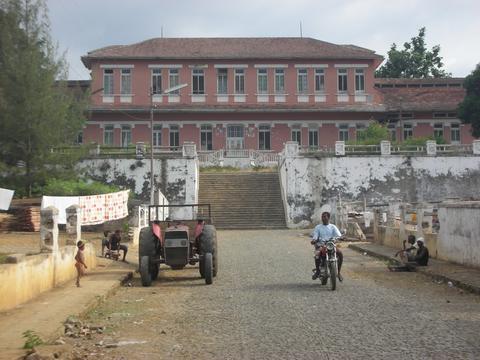
The next morning, as I prepare to leave the ship, I take a final look around haunts that are already becoming too familiar after five days on board. On the deck overlooking the one where petty officer Jones fought in vain, I spot the Equatoguinean officers sitting next to the rowing machine, heads down and looking a little bored. I ask whether they’d learned a lot that will be of practical use for their future work. They’ve done courses on board in navigation to combat, using a work sheet that describes levels of aggression ranging from baton strikes to ‘lethal force’. Mr Nzang looks up and tells me, with scornful brevity, that they haven’t learned all these skills just to ‘charlar’, or chat.
After I finish with the officers, I walk round the corner and lean on the side of the ship to note down what was said. As I’m doing so, Clifton Chang, a young crew member, pops his head round the door of the nearby weights room. We start to talk and he asks me about Nigeria, as I’d told him I used to live there. I speak about the problems surrounding the country’s oil industry.
When I’ve finished, Chang asks me: ‘Do we have any connection with oil?’
‘You tell me’, I reply with a laugh.
Chang says nothing. The thought is still hanging in the air a few moments later, as he turns back to the metal gym frame to resume his pull-ups.
Back on land in São Tomé, I walk back to my guest-house relishing the feeling of not being surrounded by people in a confined space. No-one asks any questions at the exit to the port about who I am or whether I have a passport. The freedom of movement is liberating, but it also leaves me a little fearful about São Tomé’s ability to look after itself. If you are in a resource rich-region populated by big, unstable neighbours and lusted over by leading world powers, it helps to know who is coming and going.
I round the corner to the sea front, passing an old fort that is now a museum. The area is dominated by three huge statues, of the Portuguese explorers who claimed discovery of São Tomé, Pedro Escobar and João de Santarém, plus the first administrator of the islands, Joãode Paiva. Old cannon are embedded by their mouths in the nearby sea wall, where crabs scuttle amid the breakers that pound from the Atlantic beyond. It’s another reminder of São Tomé’s exposed position in relation to the wider world: head west from here and the next landfall is Brazil.
As night falls on streets whose lights work intermittently at best, what strikes me is not how much São Tomé has changed since I last saw it, but how little. There is no sense of the circus that accompanies big crude, from mobile oil rigs to biddable prostitutes. Dolores, one of São Tomé’s main nightclubs, has a sweetness that contrasts with the sleaze of its counterparts in Port Harcourt, Nigeria’s oil capital. Travelling around São Tomé’s restaurants and bars after dark, it feels like human beings are outnumbered by the islands’ ubiquitous dogs, who seem to be barking round every corner and sitting in each pile of fallen leaves. Any oil-related buzz in this town seems still to be taking place in the privacy of people’s minds.
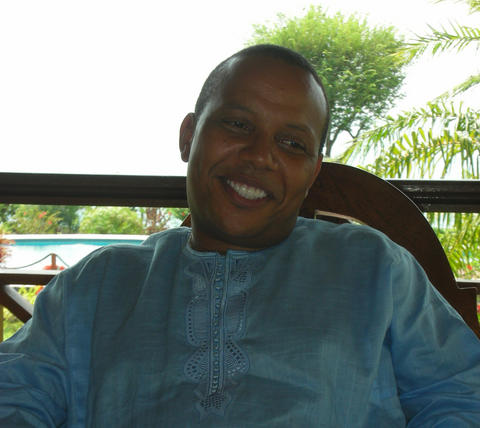
The next morning, I go to see Patrice Trovoada, defeated candidate in the country’s last presidential election. I’d met him during my last trip and found him an intriguing character: he’s a plutocrat and politician, whose father, Miguel, was a Marxist who became the nation’s first prime minister after independence and was later elected president as an independent. Patrice is keenly interested in the oil industry and the politics of it in the Gulf of Guinea. He served as foreign minister and then oil adviser in the administration of the present head of state, Fradique de Menezes, before falling out with him and becoming his main political antagonist.
Driving to Mr Trovoada’s house on the coast outside the capital, I am reminded of São Tomé’s peculiar blend of subsistence hardship and over-ripe abundance. Everywhere are reminders of both poverty and of life’s more sybaritic possibilities. The road is flanked by vegetation that seems supersized, from the arachnid sprawl of oil palms to banana plants with leaves like elephants’ ears. People – especially women – are dressed casually and sometimes skimpily, with none of the formal modesty of traditional west African body wraps or cascading robes. The small communities we pass through are calm and sedate, with none of the default street cacophony I’m familiar with from towns in mainland west Africa. Even the dogs seem sleepier than elsewhere: we have to swerve to avoid one that is lying in the middle of the highway, its companion standing over it but doing nothing to alert it to the approaching danger.
Turning off to Mr Trovoada’s house, the bitumen gives way immediately to a rocky track that shakes my taxi’s every rivet. The dismal quality of the surface is, counter-intuitively, a sign of my host’s wealth: after all, only a four by four is equipped to travel on routes like these. The way curves past a beach, where men are gathered round an open fire. Across from them, young children, probably not much older than seven, are washing clothes in a stream. Other clothes are laid out on bushes to dry in the sun, a patchwork of colour against the jungle green.
As we go further, we pass walled compounds whose sturdy gates hint at the opulence of those inside. Mr Trovoada himself lives in a vast complex of villas. I’m shown to a seat on the terrace of one of the houses, from where my view is a swimming pool equipped with life-rings, the Gulf of Guinea stretching out behind. Expensive-looking children’s toys are lying around, including a mini-quad bike. The bathroom adjoining the bedroom behind me is laid out with toiletries from London and Paris.
A couple of minutes later, Mr Trovoada appears, a youthful and handsome forty-six-year-old dressed smartly in a blue smock and matching trousers. We greet each other and I comment on how much has changed since we last met. I say that I understand he was even prime minister briefly earlier in the year, in an administration that only lasted a few months. The bitterness of his reply takes me aback. ‘As usual here,’ he says, ‘I am always briefly something.’
This scion of a political dynasty views himself as something of an outsider in his own country. Leaning back in his chair, he sketches a portrait of himself as a challenger to a myopic political class that has no imagination about where the nation should be heading. He moves his legs nervously together and apart, like an accordion, as he denounces the ‘local mafia’ that runs the nation but lacks knowledge and vision of the international interests at play in the Gulf of Guinea.
As Trovoada points out, São Tomé still has the prospect of exploiting significant reserves of the light, sweet Gulf of Guinea crude that is perfect for refining into gasoline. Just as importantly, the islands’ apparent stability and strategic position – they are nestled between Angola and Nigeria, the two great, turbulent oil giants of the region – make them a fine place from which to monitor what is going on elsewhere in this land of petro-milk and honey. The US has funded a special radar facility, which uses hill-top equipment on the islands to monitor the comings and goings of ships along a large portion of the west African mainland’s coast.
Everybody outside São Tomé views it in the context of regional oil security, Trovoada says. China is sniffing around, despite the islands’ decision to recognise its old enemy Taiwan. The Chinese oil company Sinopec has taken a stake in one of São Tomé’s fields, while the local press reported that a group of Chinese business people visited the archipelago earlier this year. Mr Trovoada says: ‘You can’t really look at São Tomé without looking at what is the power game, the sub-regional power game.’
Mr Trovoada’s gestures grow ever more expansive as he talks of how the nation needs to ‘wake up’ before it is too late. It has drifted for years, he says, in the mistaken belief that oil will solve all its problems. As production has taken longer than expected to arrive, so frustration has grown and has become more unstable, manifested in events such as an abortive military coup in 2003 and the uprising of an elite police unit called the Ninjas in October 2007. São Tomé, still dependent on cocoa and other crops, has suffered in comparison with resource-poor west African states such as Senegal, Mali, and Burkina Faso, which have been much more savvy about securing international help for development. ‘For seven or eight years we have not been doing that,’ Mr Trovoada says. ‘We have been behaving like a rich country. People were really thinking: ‘with the oil revenue we will fix it.’’
I say that he almost makes it sound as if the country would be better off if it were to find out it had no oil. ‘Of course,’ he fires back immediately. ‘Me, I am very comfortable if tomorrow I am back in government to deal with this country with no oil. We can be a hub of the Gulf of Guinea. But we need to have a vision.’
Mr Trovoada’s state-of-the-nation spiel is hardly disinterested or without its contradictions. For one thing, his take-it-or leave it political approach to oil doesn’t really marry with his own personal preoccupation with the subject. He gives little away about his business empire, other than admitting involvement in real estate, construction in Houston, Texas, and – increasingly – ‘energy and other things’ in west Africa. He’s due to leave in a couple of days’ time on a month long trip to investigate business opportunities in Nigeria, Equatorial Guinea and Libya, oil producers all. He jokes that if he quits São Tomé for good, he will have to go to ‘detox clinic’ to rid himself of the dirt in the politics there, including in his own party. ‘After the detox,’ he laughs, ‘maybe I will stay here and do a little bit of business.’
The same sense of murk that Mr Trovoada evokes has characterized the slow, painful birth of São Tomé’s oil industry. For years, the country’s efforts were hamstrung by a contentious deal under which ExxonMobil, the world’s biggest oil multinational, and an obscure small US company called Environmental Remediation Holding Corporation were awarded strikingly favourable oilfield rights. After prolonged renegotiation, São Tomé and Nigeria finally auctioned a number of jointly-owned fields in 2004. That, too, proved contentious, with a 2005 report by São Tomé’s attorney general claiming that the process was skewed in favour of influential small Nigerian companies with no experience of large-scale oil production. ‘The round was subject to serious procedural deficiencies and political manipulation,’ the report said, ‘including the award of interests to many unqualified firms or firms with inferior qualifications, technically and financially.’
The main oil action in São Tomé to date has been in a field bought for \$123m by consortium head by Chevron of the US. Chevron has a local office at the heart of the capital, also called São Tomé, but it is surprisingly hard to find. Tucked into a side-street off one of the main squares, in an old colonial house with tall maroon shutters, it has no company logo on the door. Even in the elegant ante-room, there is no sign of corporate branding. The only hint of oil is a painting of an offshore rig, set against a background of half of a yellow sun.
Inside, I’m greeted by Armindo Gonzago, Chevron’s local head of public affairs. He recounts how Chevron announced two years ago that it had discovered oil, although it has said it is too early to say whether the quantities were commercial. Since then it has been looking for the results of exploration in some of the other fields. ‘We are keeping doing some evaluation,’ Mr Gonzago says, ‘hoping we can get some information on the adjacent blocks to decide what the next step will be’.
In the absence of oil, Chevron has focused on social projects in areas such as water-supply, health and sanitation. It – along with its oil company partners – is also providing educational scholarships. These have provoked heavy criticism in other countries in the region, such as Equatorial Guinea, where they are seen as ways for multinationals to win favour with local politicians by giving their relatives grants. Chevron says that, of 30 students who benefited from \$39,000 of university scholarships awarded in the 2006-7 academic year, only one – the niece of the then natural resources minister – was related to government official. The university gave the company a statement testifying that her family relationship played no part in her selection.
I ask Mr Gonzago why his office is so anonymous, with no Chevron nameplate. He says the company is trying to keep a low profile and to hold down expectations, ‘because it’s a very poor country, and the smell of oil opens the appetite of everybody’. People say ‘‘We are going to have oil, now we are going to be well off,’’ he adds. ‘And the politicians play with that a lot.’
People are frustrated that oil has not come, Mr Gonzago acknowledges. It’s a problem made more acute by people’s desire to cash in on the international obsession with oil supplies. The company has found itself in political arguments with the authority that manages its field, which is 40 per cent owned by São Tomé and 60 per cent by Nigeria. The zone’s developers think the company knows about more about the oil prospects than it is letting on. ‘They say: ‘Chevron is not telling the truth. We have data that contradicts what Chevron is saying,’’ he shrugs. ‘But they have never presented Chevron with that data.’
His assessment leaves me wondering about the dangerous impact of the gap that seems to have emerged between expectations in São Tomé and the much slower-unfolding reality. Here is a country that, cruelly, is being undermined not by the presence of oil but by the lack of it. Mr Gonzago makes the national lust for crude sound almost psychotic and irrational, I say. ‘Well,’ he replies, ‘I think I myself would have the same opinion had I not been exposed to some more detailed information. When I didn’t know what the business was like, I thought the same way.’
Mr Gonzago shows me out through the ante-room, past the picture of the oil platform. The painting was done by a local artist, he says, working from his imagination because there are as yet no rigs off São Tomé. I ask whether the part-visible sun is supposed to be coming up or going down. ‘I think it’s setting,’ Mr Gonzago replies, flashing me what seems like a mischievous smile.
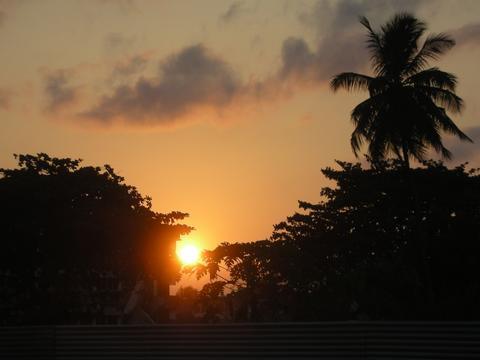
On my last day in São Tomé, I want finally to touch the elusive oil that has been constantly in my conversations and consciousness throughout the trip. I head for one of the spooky old cocoa plantations, known as rocas, that stopped in time when the Portuguese colonialists fled suddenly in 1975, abandoning their grand residences and hospitals to squatters and the jungle. My destination, Uba Budu, is reputed to be close to a lake of oil, known locally – and evocatively – as the agua petróleo.
The gravel road to Uba Budu passes little that is man-made, save the crumbling old walls built by imperialists who thought they would rule forever but ended up leaving in a hurry. My taxi driver and I give a lift to an old couple we see walking slowly ahead of us, the distance they keep between them suggesting long familiarity. Both their faces are etched with deep lines, like the tyre treads we are following up the forest track. The man is taciturn but the woman talks urgently in Creole, communicating a controlled desperation through the remainder of the drive.
It is late in the afternoon by the time we reach the first of Uba Budu’s ghostly houses. In the plantation’s main square, a group of young men watch us from a small outhouse set a little apart from the sprawling white main building. The old woman gets out of my taxi, looking at me and raising her hand to her mouth in a plea for money. When I give her about one pound fifty worth of dobres, the national currency, she grips my hand with a strength unnerving in one apparently so frail. The intensity of her gratitude fills me with loathing, both for the economic gulf from which it springs and for the feeling of power it wakes in me.
A few of the men wander over from the outhouse to talk to us, one of them rocking along on crutches several yards behind the main group. The oldest of them, his hair unusually unkempt for a society notable for its high standards of personal grooming, wags his finger in warning when he hears our plan. He doesn’t rate our chances of reaching the agua petróleo before nightfall, although he is reluctant to tell us exactly how far away it is. His negativity makes me cussed and determined to go, even though instincts honed in similar situations suggest I should hesitate. The local advice is to hold back, darkness is near, and I am the centre of attention of a crowd of young men. But I remind myself that I am the right side of the frontier of the incendiary Niger Delta, across the Gulf of Guinea waters from where we are standing. São Tomé is a peaceful place, not yet corrupted by oil conflict. Besides, I now crave sight of the crude reputed to be sitting in the forest, tempting and untouched.
After a few minutes of cajoling, a snake-thin young man named Afocinho Viera agrees to lead us to the agua. We start at a fast walk that soon turns into a jog. It’s hard work, but comfortable enough, until Viera and Kaizer Montero, another youth who has joined us, dart off the path and into the trees. Soon they are springing down the rocky, loose-soiled paths, moving like mountain-goats in flip-flops as I plod like an elephant in my trainers. As we hurtle deeper into a forest where tarantulas and cobras live, I feel elated by the recklessness of the chase. We are alone with the birds and whatever else lurks in the darkening jungle.
Three-quarters of an hour later, my body coated in a membrane of sweat, I am starting to regret the stubbornness of my pursuit. I feel like a spoilt kid each time I ask Viera and Montero whether we are nearly there. I realize I must cut a ridiculous figure, my shirt flapping open in the breeze like a mad professor’s lab coat. Then Viera stops suddenly. He gestures to the right of the stony track, towards a small pool of water flanked by a scattering of giant fallen leaves. Peering down, I see the water has a rusty brown colour and the unmistakable iridescent sheen of oil. It is the agua petróleo.
We jump down onto a spit of land, into which my shoes sink as if it were quicksand. Viera leans down by the edge of the pool, which is bubbling gently like a cauldron coming to the boil. He scoops up some liquid and holds his fingers up to me. The brown fluid coating them has the same smell and feel as the light, sweet crude that I’ve handled in oil spills in the Niger Delta. I scoop some up myself, gazing with the exaggerated fascination of a small child as it trickles down my fingers, mingling with the perspiration from the effort of reaching this place. I wonder if this is how Africa’s resource-hungry imperial adventurers have felt over the centuries, at the moment of grasping the prizes for which they have bought and fought so ruthlessly.
Tracing the sweet, slick veins of precious fluid now running in deltan rivulets across the palm of my hand, I am silent in thought for a moment. I feel I am finally a step ahead of the breakneck expansion of the crude industry whose tumultuous wake I have constantly crossed in this region. This oilfield is unobtrusive, unfenced, and all but untouched, although I wonder how long this will remain the case. If the Niger Delta is anything to go by, it may be only a matter of time before geological accident thrusts this agua petróleo into one of the great geopolitical fights of our age.
Mr Viera and Mr Montero are both excited about the prospect of São Tomé having oil. They say a Filipino man came a few months ago to look into tapping the agua petróleo, although they’re hazy on the details of what happened. There is, Mr Viera says, muito dinheiro – a great deal of money – in oil. Mr Montero adds that the country can ‘really move’ with crude. ‘We can have roads, better communities, better electricity, hospitals’, he says.
I ask whether that is really what will happen. I point to all the problems Nigeria and other oil-producing states in the Gulf of Guinea have had. Aren’t they worried there will be conflict in São Tomé , too? ‘No’, replies Mr Montero, ‘because São Tomé is very small, and there is a good understanding between the people.’
The men start scooping oil on to fallen leaves to pose for photos that I have trouble taking because my hands are so slippery. Once touched, the crude just seems to spread unpredictably and uncontrollably, coating my paper and clogging my pen as I try to write. As Montero holds up hands caked with filth, he tells me that he’s confident the wealth will be managed for the best, with Nigeria as São Tomé’s business partner. His reasoning both thrills and chills me, reminding me why I and so many other foreigners find west Africa’s cult of crude such a powerful, dangerous and seductive draw.
‘Nigeria,’ Montero says, peering carefully towards me in the fading light, ‘has experience of these things.’
Click here to view a photographic diary from Michael Peel’s journey.
Featured photograph by Francisco Anzola; in-text photographs by Michael Peel







